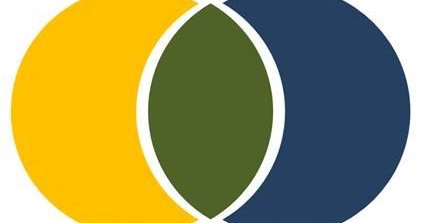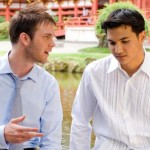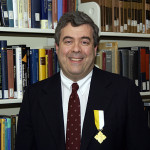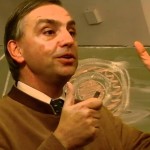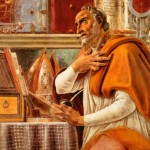I Need a Better Science/Religion Venn Diagram
by Chana Messinger
Filed under Science
EDITOR'S NOTE: Today's guest post is from popular atheist blogger Chana Messinger, who writes at The Merely Real, and it's in response to Jimmy Akin's article, Why We Should Be Cautious Using the Big Bang Argument. Jimmy has since written another piece in response.
Jimmy Akin’s piece warning Catholics not to put too much stock in any given scientific explanation of the Big Bang is very interesting. For most atheists, the first and perhaps only question about religious claims is, “How do you know?” It is a request for evidence only satisfiable within the epistemological framework of modern rationality, which in a case like this means scientific, empirical findings.
Empirical Religion?
Religious people have a number of philosophical responses to such a request. They may claim that they share standards of evidence with their atheist interlocutor, and that the science is simply on the religious side. This is frequently the purview of creationists, who are often very well informed about the intricacies of radioactive dating and the weaknesses of paleontology. That’s a dangerous business, though, since a rationalist epistemological framework demands that one is only as sure of a result as the evidence allows, and that one be willing to change one’s mind if the evidence doesn’t turn out as expected. As far as I have been led to believe, such a way of thinking is not particularly compatible with sincere religious faith.
In addition, this approach comes off to atheists as intellectually dishonest. There is something crass about claiming that there is a religious realm of knowledge entirely distinct from empiricism which truth can be found and yet that all empirical evidence lines up distinctly and without exception in your favor as well. It’s similar to political partisans whose interpretation of the Constitution just happens to line up extraordinarily well with their beliefs about ideal public policy. Mike Adams, in his recent piece on Mormonism, criticizes Mormonism both for its inconsistency with the Holy Bible and for its inconsistency with archeological fact (implying, of course, that his religious beliefs were perfectly consistent with both, and that both are legitimate avenues to truth). To claim both standards of truth at once is mildly suspicious.
Non-Overlapping Magisteria?
But only mildly, because in fact this difficulty is trivially simple to dispose of. Many, many people have thought of the solution before. If you have two standards of truth that you’d like to keep intact, never let them answer the same questions. From here we get Stephen Gould’s Nonoverlapping Magisteria and who knows how many religious folks’ conception of the same idea, and, all within the same intellectual tradition, Jimmy Akin.
If Akin successfully makes his point, and no one thinks that the Bible makes scientific claims, then there’s never any conflict, no double-truth. Science answers the what and religion answers the why, as a common saying goes.
But it can’t be that simple. It can’t be, because Christianity does answer certain empirical questions. For instance: Did Jesus really live? Did he really die and resurrect 3 days later? My understanding is, if the answer to these questions is no, then Christianity is a false religion.
A Hierarchy of Sureness
So what are we to make of Akin’s argument? When Leah Libresco converted from atheism to Catholicism, every atheist I knew seemed to be asking what evidence she had seen that had convinced her. What did she know that we didn’t?
But that was the wrong approach. The reason, as far as I remember, that Leah Libresco converted is that she was more sure of objective moral facts than she was of the empirical evidence against God. That’s the key. She was more sure of her morality than of her epistemology. So she backslid and changed her epistemology. This is rare, but within her system, it makes perfect sense.
Akin is not merely more sure of God and Catholicism than of science. He is infinitely more sure. As he says,
“Losing scientific support from the Big Bang would not disprove the existence of God. It wouldn't even disprove the Kalaam cosmological argument. It would just mean that the premise in question would have to be supported some other way.
If it were to turn out that the Big Bang was not the beginning of the physical universe then this argument in apologetics would have to be revised.
That's nothing to be ashamed of, though. Apologetics, like the physical sciences, is subject to revision based on the evidence available at the time.”
There is simply no evidence that will change his mind about God.
Given this hierarchy of sureness, this theology, this epistemology, Akin’s piece is exactly right. In fact, what I find most interesting about it is that it resonates in part with the Less Wrong style of looking at the world. Everything adds up to normality, say the rationalists, and everything that is true is already the case, so we must let the evidence push us towards truth and keep ourselves unattached to beliefs we may not want. And so the theists say, everything adds up to God, and God is true, and God is the case. Any scientific truth will lead to God and no scientific finding can overturn God. Thus, theists may be light as a leaf regarding scientific truth, and let the evidence take them where it may. To imbue a model, whether the Big Bang Theory or Creationism, with religious truth, is to chain God’s truth status to that of a changeable fact. This is theologically unacceptable and argumentatively ill-advised.
Perhaps we are now saved from the horns of contradiction. To be that much more sure of religion than of empirical truth makes religion a trump card; any time there’s an overlap between religious epistemology and empirical epistemology, religion wins the trick. Apparent contradictions can be dissolved by a total faith in God and God’s truth.
What would that mean?
If this model is accurate, then I am tempted to say that we should throw our hands up and decide that Wittgenstein was right all along. The world consists perhaps less of people who have different predictions about what the world looks like, and more of people who have different orientations to the world, who take different axiomatic truths as obvious, who orient themselves to the world in different but individually unjustifiable ways. This takes us back, in some ways, to the general tradition that gave us non-overlapping magisteria. People just evaluate truth differently and there’s no objective way to decide which is best, at least from among the most reasonable options. There’s simply no discussion about the fundamental points to be had. The apparent contradiction disappears because the standards of truth are different.
But this just doesn’t hold up. Many religious people I know wouldn’t want the “out” that the first option provides; they are willing to make empirical claims and believe in them wholeheartedly. And Akin, as I argued above, does believe that the Bible requires making the empirical claim that Jesus lived as is recounted in the Gospels, died and was literally, empirically, resurrected. The intersection is inevitable. But no scientific fact will change his mind about the bible or God; his Bayesian priors for both are 1. This gives us the same contradiction and potential for intellectual dishonesty as above. If you agree on science as an epistemology, and you hold empirical facts to be true, you no longer get to retreat to Non-Overlapping Magisteria or anything similar.
Or...
The other option religious people and atheists and agnostics have is to agree on standards of truth so that they can engage within the same framework. After all, questions like who the Problem of Evil is more of a problem for, while fascinating, don’t answer the fundamental question; they are no one’s (or almost no one’s) True Rejection to either atheism or Catholicism.
But it is blatantly obvious that Catholics and atheists don’t have the same standards for truth, and to pretend to for the sake of dialogue would be a farce.
So we have a problem.
Atheist argumentation may have its flaws, but it is generally consistent on its epistemology: reason and empiricism. Perhaps the Catholic response is well documented in the literature, and I am simply insufficiently familiar with it. But as I currently see it, the onus is on Catholics to give a more thorough account of exactly how the epistemologies of faith, reason and empiricism interlock, what predictions they make, and which beliefs they feel are fundamental, versus which they would be willing, in the final analysis, to relinquish to the cleansing fire of truth.
I think Akin provides a useful and thought provoking model of how to deal with science and religion. But it is not enough.
Related Posts
Note: Our goal is to cultivate serious and respectful dialogue. While it's OK to disagree—even encouraged!—any snarky, offensive, or off-topic comments will be deleted. Before commenting please read the Commenting Rules and Tips. If you're having trouble commenting, read the Commenting Instructions.




